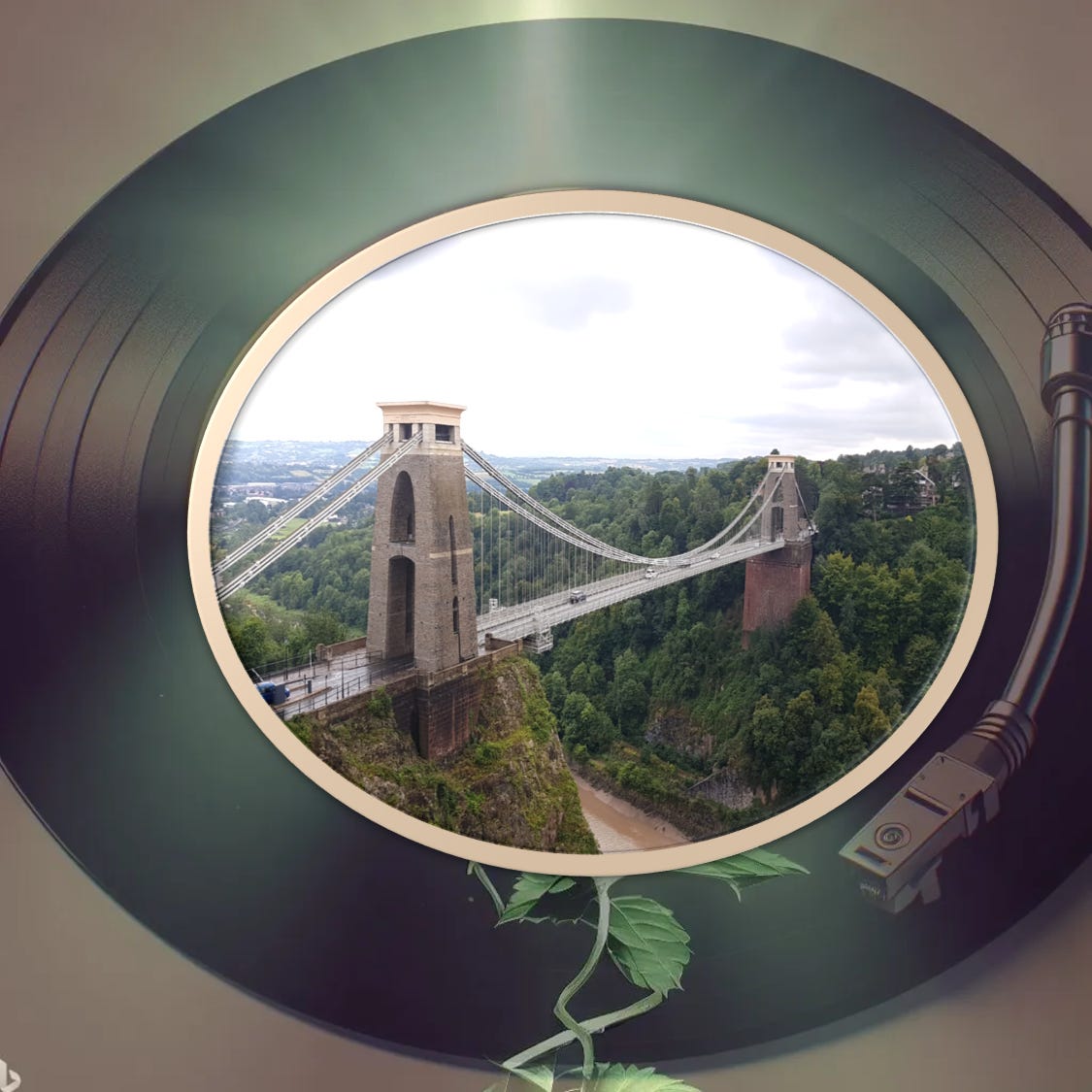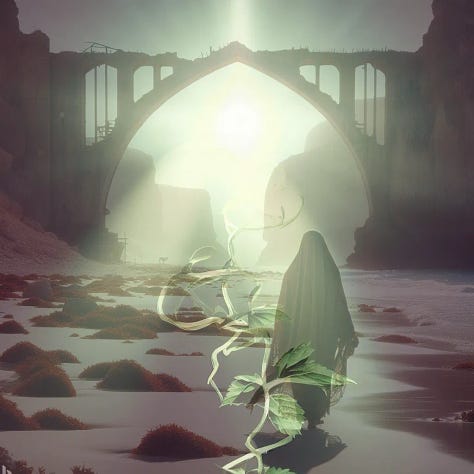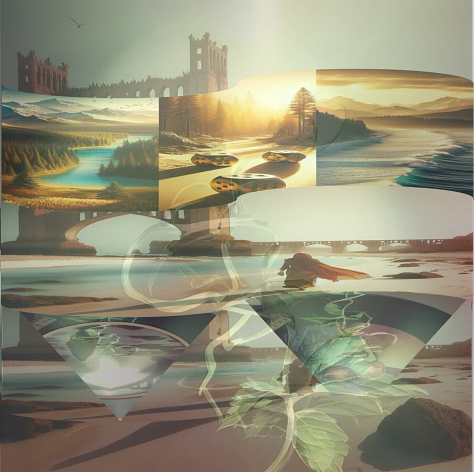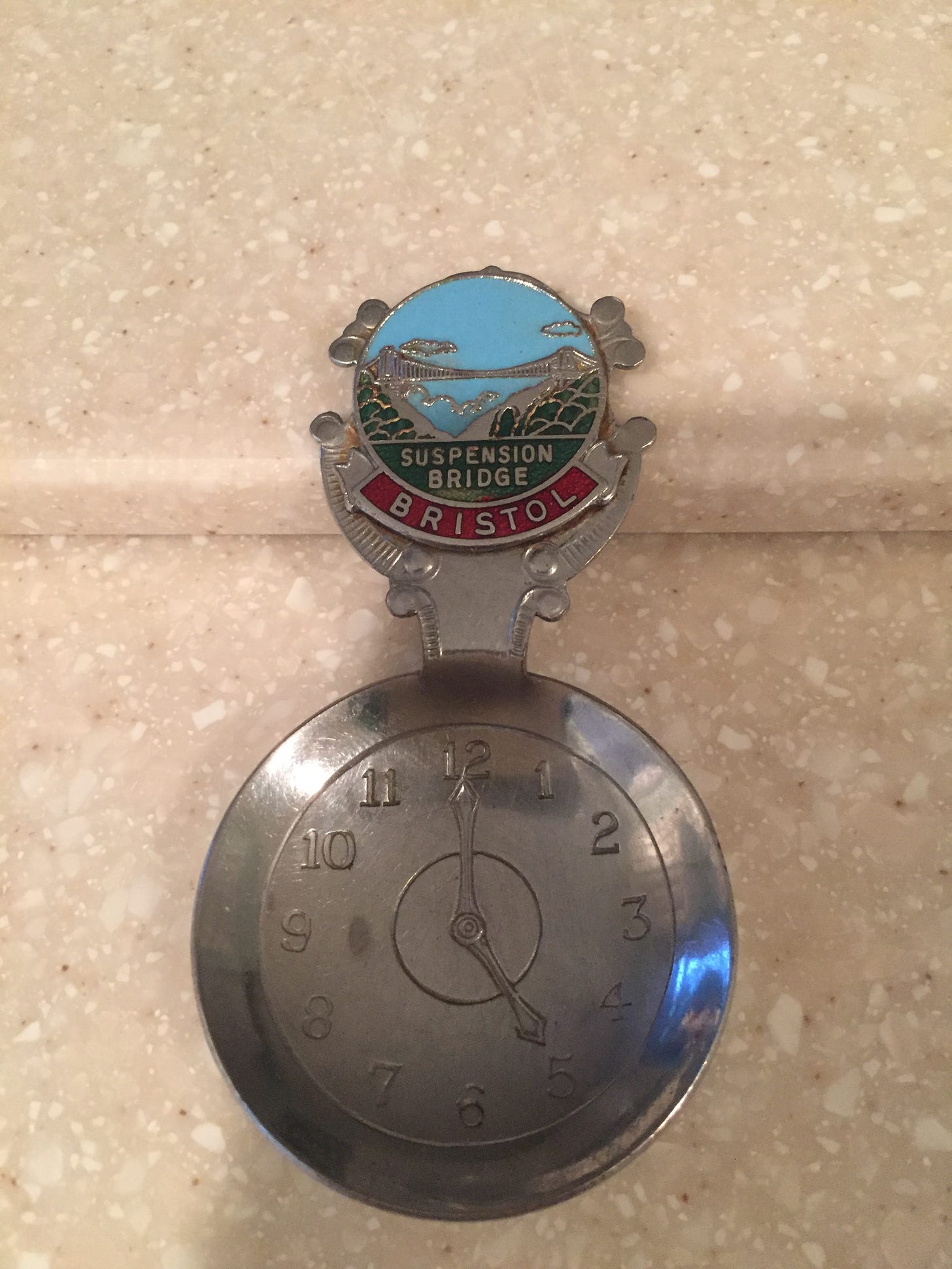S14, E3B: Bridge Building
Series 14: Ayaan Hirsi Ali and the Bridge Between Wildernesses

This is the B-Side counterpart to S14, E3: On Risk and Reward, continuing the series talking about ’s open letter, Why I am now a Christian, published on Unherd at the end of 2023.
Welcome to The B-Side
My world it moves so fast today
The past it seems so far away
And life squeezes, so tightly that I can't breathe
And every time I've tried to be
What someone else thought of me
So caught up I wasn't able to achieve
“The Miseducation of Lauryn Hill”, Lauryn Hill1
Stark Estrangement and Harm
In prehistoric times, the places that some primates would eventually name Clifton and Leigh Woods were riven by gigantic ice flows. When the ice melted they were separated by a gorge that was over 213 m/700 ft across and 91 m/300ft deep.2
No sooner than 424,000 years later (bureaucracy being what it is) Isambard Kingdom Brunel entered a competition to design a bridge to span the Avon Gorge. Cutting the story down to its bare minimum so I can use the engineering and history for another series - his proposal prevailed.
Even before completion in 1864, it became an iconic symbol of Bristol, a South Western City in England. When returning home it’s a welcome message pinned to the skyline that only a Bristolian could read.
Peacemaking of the Unblessed Kind
Bridges are special because they connect places and the people in them. My earliest memory of the bridge is coloured by what was already a familiar feeling of estrangement. I went there with my father and can precisely pin down the day; a Saturday somewhere in the mid to late ‘60s.
Once a week he would arrive to assert his court-ordered access and become one half an altercation on the doorstep. My parents were separated before I was two years old so these meetings (that my mother had good reason not to want) were because of me. I was conflicted and managed to feel disloyal to both of them at the same time. Most of all, allowing myself to be dragged away by a grown man, felt like the worst betrayal.
For most of my life I thought that generosity could repair almost everything, which is peculiar, not being able to think of one thing it ever fixed. It might have been a pattern that started that Saturday, because there was a gift shop near the bridge and much to my father’s annoyance, I wanted to buy my mother something with the money he had just given me. This was one of my earliest attempts at atonement over fifty years ago.
From my earliest memories I was trying to be a peacemaker but ‘blessed are the failed peacemakers’, is not in the Christian cannon. I wondered what it meant to be good and couldn’t understand why ‘good works alone’ weren’t enough to deserve salvation, or for that matter, a childhood. I was told the road to hell was paved with good intentions, so wanting to be good, being good and doing good wasn’t enough.
Something cracked and a gap opened up and in that place I could no longer expect straight answers. Yet at least I knew that even the most terrifying of chasms could be crossed because here was a magic trick where a road could be suspended from the sky. I really needed to believe in bridge building.






A Bridge Too Far?
I always thought that Ayaan Hirsi Ali belonged as the “fifth horseperson” alongside Dennett, Dawkins, Hitchens, and Harris. After all, her arguments against religion were as strong and well expressed as those of the “four horsemen”.
“Ayaan Hirsi Ali ditches atheism, becomes a Christian”, Why Evolution is True, Jerry Coyne
It’s not over-effusive to suggest that what she had to say from experience might come up to snuff for an academic discussion. Hirsi Ali’s disillusionment with Islam and its treatment of women owes nothing to atheism because her views on that were in place while she was still Muslim. Even after becoming an atheist she advocated for Islamic reform, and as far as I can tell, that wasn’t anything to do with an objection to spirituality.
Like many atheists, I made a study of the ‘Four Horseman’ event, but it was only while writing this series that I really considered just how different it might have been had Ayaan Hirsi Ali made it to Washington as planned.
During that conversation, Sam Harris suggested that some religions might be worse than others, but it was barely considered by the others, who quickly concluded that all were equally bad. If only Hirsi Ali were there.
What atheism did was broaden the scope of her religious criticism. It’s clear she now sees much of that as an over-generalisation.
Near the end of Coyne’s article he shares this extract.
Yet I would not be truthful if I attributed my embrace of Christianity solely to the realisation that atheism is too weak and divisive a doctrine to fortify us against our menacing foes. I have also turned to Christianity because I ultimately found life without any spiritual solace unendurable — indeed very nearly self-destructive. Atheism failed to answer a simple question: what is the meaning and purpose of life?
“Ayaan Hirsi Ali ditches atheism, becomes a Christian”, Why Evolution is True, Jerry Coyne [quoting Hirsi Ali]
In order to say this:
This didn’t seem to be a problem for Harris, Dennett, Dawkins, or Hitchens!
ibid.
This is astonishingly crass. I deleted my parody of that remark deciding that ridicule would be redundant.
Hirsi Ali grew up under religious oppression where women are a commodity, fought her way out and went on the run from everything she knew, including her family. It’s odd to compare what is problematic to a female apostate of Islam with what was non-problem to four men who spent a couple of hours trying hard not to contradict one another in Washington.
She had more reason to be an atheist than most people which made her a sincere and powerful advocate, plus she understood the atheistic arguments, creating some of the better ones. What’s extremely important about her letter is the thing that atheists find least interesting - the failure of atheism to build bridges.
Canary in the Mine
Despite the treatment she received at the hands of the one religion she has sought to re-engage with her spirituality. I think this is a bellwether for a far bigger problem that cannot be explained by those who suggest she was unable to overcome her formative programming. She did overcome it - this is hardware.
Hirsi Ali mentions her need to find meaning and purpose. Did that make her wonder what atheism could offer other ‘spiritual’ people with less cause to reject religion than her? Should she have continued to make atheistic prescriptions while finding them unsatisfying for herself and useless against the threat of pernicious ideology?
For some, radicalisation offers a one-stop-shop of answers, with no thinking necessary or debate allowed. If nothing else it’s convenient. The offer of certainty is built into totalitarian regimes, religious sects, post-modernism and other societal re-engineering projects.
Should we expect that conversations about the existence of god (amounting to little more than an exchange of contradictions) can achieve anything? To find their way out of extremism some people will need the bridge that secular humanism tried to build.
Here is another paragraph quoted by Coyne:
But we can’t fight off these formidable forces unless we can answer the question: what is it that unites us? The response that “God is dead!” seems insufficient. So, too, does the attempt to find solace in “the rules-based liberal international order”. The only credible answer, I believe, lies in our desire to uphold the legacy of the Judeo-Christian tradition.
ibid. [excerpt from Ayaan Hirsi Ali’s open letter]
To which he comments:
No, all atheists are not united by the mantra “God is dead”. Most of us are secular humanists, adhering to a set of values that were largely developed by unbelievers seeking to mold a better society.
ibid.
Good to hear that they are mostly secular humanists but they seem to been a quiet bunch particularly when their founder Paul Kurtz was being run out on a rail by new atheism. Frankly, who is responsible for the values that underpin the culture is not very interesting, while we ignore the ‘formidable forces’ of which she speaks. It’s more pragmatic to focus on what that culture has given the and make the case for its protection.
Only a few hundred words later Coyne says this:
Unfortunately, religion might give you a meaning and purpose of life, but they are bogus ones.
So much for secular humanist discourse.
… in fact, some of it might comprise evolved tendencies that were adaptive for individuals living in small groups.
ibid.
This is far more constructive so I want to give you my thoughts on that before continuing.
Diversion
How could there not be an evolutionary survival benefit in a sense of the spiritual? Why is there not a greater interest in offering a scientific reason for a phenomenon that seems to have accompanied humans everywhen and everywhere. If it can be shown to be real with an identifiable cause perhaps we can have a productive conversation about what it means to us now.
As mentioned in an earlier episode, Alex O’Connor may have been on to something when he wondered out-loud if religion could be performative. Perhaps, as a practice like meditation or sports visualisation, it could be beneficial to many people. Is it possible to tap into a primal sense of the spiritual without having to subscribe to the supernatural? Shouldn’t we at least be asking the question. Explaining the mechanics of ‘spirituality’ has to be more useful than another, ‘you are all delusional’, tour.
We should get into something real
[…],
that's goin' on two tours old now...
We gotta come up with some new shit ...
“Wait A Minute”, Sheik Yerbouti, Frank Zappa
Diversion Ends
And why only “Judeo-Christian” tradition? I can understand why Hirsi Ali leaves Islam out, but what about Buddhism or other “legacies of religious tradition?”
“Ayaan Hirsi Ali ditches atheism, becomes a Christian”, Why Evolution is True, Jerry Coyne
Assuming this to be a serious question I’ll take a stab offering some answers.
Could it be because -
she is familiar with the Abrahamic religions?
Buddhism (for example - which practitioners would argue is not a religion) is not the basis of Western culture, traditions, parliamentary process and law?
Christianity is a natural stepping stone between the tolerant ‘gentle, meek and mild’ and the extremes of Abrahamic dogmatism?
taken as a whole, Christianity is almost secular i.e., the fundamentalists sects are heavily diluted by moderate churches?
At any rate, all you need to know to refute this [that atheism is insufficient] and what’s below is that one can derive ethics not from “religious tradition”, which may or may not (but usually does) incorporate the supposed dictates of God, as in the Ten Commandments, but from pure philosophical musings that don’t involve a deity.
ibid.
Except that’s not all we ‘need to know’, because although the origin of ethics might support the case for atheism, it unlikely to be the reason for being an atheist. Understanding how a lighting circuit works is not the reason for throwing a switch - usually we just want some light. Also how likely is it for anyone to have been immersed in ‘philosophical musings’ that are not part of a religious bundle?
I know, ‘it needn’t be the case’, but explain why the secular humanism conceived by Kurtz and the bridges he tried to build are now all in ruins? Help me understand why the new atheists vandalised them.
Context Over Attribution
Finally, as many religionists do, Hirsi Ali imputes any moralistic or philosophical advances in modern Western society to Judaism and Christianity, simply because both faiths (mostly the latter) were the main set of religious beliefs in that society.
ibid.
The correlation is not trivial.
Note that Hirsi Ali immediately becomes a ‘religionist’, which is not just a person with a different opinion, but someone who is on an entirely different team. In this case it would be more accurate to say that she recognises the religious context of moral progress.
But that doesn’t mean that these faiths were responsible for moral values, any more than they were responsible for scientific advances, also largely developed in Judeo-Christian societies.
ibid
True but some great philosophical and scientific breakthroughs came from minds where faith co-existed. Were those beliefs irrelevant or did they apply evolutionary pressure and context for those moral and scientific ideas? Perhaps we could ask an evolutionary biologist whether that is a good analogy for inspiration. Isn’t it obvious that Hirsi Ali was talking about having a cultural framework to hang our values on? Her atheism aligned to a fight she was already having with Islamic fundamentalism.
I imagine that if she continues to argue for Islamic reform, that mission will be no more a subset of her Christianity, than it was her atheism. What will be changed is where she is positioned within the conversation. To talk someone down from the ledge you have a better chance standing at the window than yelling from the ground.
We need to put thought into what we want and perhaps a start would be to reward the right things and stop condemning those whose reserve the right to go where their thinking takes them. Most people would probably say they admire those who have the ability to think independently. In practice it rather depends on whether or not we agree with them - so what we see as greatness is less about attribution and more about the context.
Hirsi Ali’s contribution to the conversation has been extremely valuable and qualified by her unique experience travelling alone between wildernesses. If she can be discounted for declaring a belief in a god, what hope is there for the secular humanism that Coyne espouses?
It’s no longer good enough to simply rehash the spontaneous remarks that left the Hitchens’ cuff over a decade ago and it’s insulting to his memory to suppose his views would not have changed since 2011. That his thinking evolved is arguably what distinguished him from the company he kept.
Some people suspect Ayaan Hirsi Ali’s conversion to be ‘political’ (by which they mean ‘disingenuous’), possibly because she does not appear to be loved-up over Jesus and her account does not include a, ‘road to Damascus’ moment. I concede that this might owe more to pragmatism than epiphany, but taking the trouble to think about the strategic value of the more moderate forms of Christianity, doesn’t make her insincere.
Of course, this is not the first time she has exposed herself to the risk of being misunderstood, but as the great engineer and innovator Isambard Kingdom Brunel may have attested, that’s the nature of bridge building.
[Lauryn Hill on this song] … it has a lot to do with finding out about your own aspirations and your own dreams, and not those […] that some might have for you. It’s a song about movement and growth and inspiration.
I want to encourage all of those who are moving from one period to another, […] or any life lesson in general– […] to be strong, to be independent, to be positive, and to know that you can choose your own destiny and your own path.




